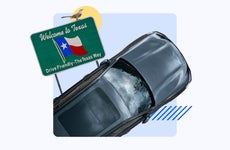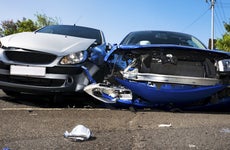What happens if you get caught driving without insurance?

The Bankrate promise
At Bankrate, we strive to help you make smarter financial decisions. To help readers understand how insurance affects their finances, we have licensed insurance professionals on staff who have spent a combined 47 years in the auto, home and life insurance industries. While we adhere to strict , this post may contain references to products from our partners. Here's an explanation of . Our content is backed by Coverage.com, LLC, a licensed entity (NPN: 19966249). For more information, please see our .
Almost all states require that drivers maintain active car insurance coverage in order to drive legally. If you are driving without insurance, you run the risk of facing penalties that include fines, loss of your driver’s license and potentially jail time. If you are involved in an accident while driving uninsured, you may also be required to pay for vehicle damage and personal injuries others incur out of pocket. Plus, securing car insurance in the future may be even more expensive.
Can you drive without insurance?
Most states require you to purchase at least the minimum required car insurance coverage types and limits to drive legally. In many states, though, you can satisfy a similar “financial responsibility law” in another way, like posting a bond or showing proof of self-insurance. While these methods allow you to drive without car insurance, they are usually more expensive than purchasing a policy.
Although the mandatory minimum coverage levels differ by state, most states require at least the following types:
- Bodily injury liability: This covers medical costs for anyone you injure in an at-fault auto accident. Coverage limits can vary, and if your limits are too low, you may have to cover the additional injury-related costs out of pocket.
- Property damage liability: This part of your policy covers damage to the other driver’s vehicle and any other property damaged by the accident (such as a fence or light post).
Some states also have other requirements, such as uninsured and underinsured motorist coverage, medical payments coverage or personal injury protection (PIP). The latter two cover your medical costs and those of your passengers and are mandatory in some states, but optional in others.
Penalties for driving without insurance
If you drive without auto insurance, you’re likely to face consequences. The severity of these penalties depends on a number of factors, including the state you are in when it happens and whether this is your first or a repeat offense. There are many ways you could be identified as an uninsured motorist, and that matters, too.
Getting pulled over without insurance
In most states, if you are pulled over for the first time without auto insurance, there will be a fine. In California, for example, you could pay $100 to $200 plus penalty fees for a first offense. In addition, other states, such as Florida, will suspend your driver’s license and registration and require fees to have them reinstated.
In some states, including California, the law enforcement officer who pulls you over has the right to impound your vehicle if he or she deems it necessary. You would then be responsible for towing fees and other costs involved and might not be able to get your vehicle back until you have proof of auto insurance. You may also need to file an SR-22 certificate in most states stating that you are now carrying the required minimum coverage.
Once you have been cited for not having auto insurance, you may find that the cost of car insurance — which you’ll probably have to buy to get your license reinstated or your car out of the impound lot — is higher than if you had had a policy all along. Insurance companies may view you as a higher-risk driver.
Getting into an accident without insurance
If you get into an accident without auto insurance, you may face some serious consequences. You will be subject to all the penalties described above and are more likely to have your license suspended and your vehicle impounded. If you are involved in a serious accident and not properly insured, you will likely be required to file an SR-22 or FR-44 with your state’s Department of Motor Vehicles (DMV). Finding coverage in this situation may be more difficult but could also classify you as a high-risk driver where you can expect more expensive premiums. Stipulations for these certificates vary by state, but you may be required to hold an SR-22 or FR-44 for a few years.
If you caused injuries and property damage as a result of the accident, you could find yourself facing high out-of-pocket costs as well. If you had insurance, you could rely on your policy to help you pay for the damages. As an uninsured driver, they may fall completely to you.
If you are unable to pay for the cost of the accident, you could face financial distress. Because costs for medical care and vehicle damage can add up quickly, you may find yourself in a tough position.
How do you get car insurance when you are uninsured?
If you have been driving without auto insurance, you should consider purchasing a policy as soon as possible. This will not only ensure that you meet your state’s requirements for legal driving but can also help protect you from the financial fallout of causing an accident. You may not be eligible for the lowest premium because driving without insurance puts you in a higher-risk category, but you could find reasonably priced coverage if you shop carefully. Getting quotes from a variety of car insurance companies can be helpful in finding a competitive price.
Frequently asked questions
-
-
Yes. It’s common for your license to be suspended if you are found driving without insurance, whether or not you caused an accident, but it’ll depend on your state’s laws. To reinstate your license, you’ll likely have to show proof of insurance. In addition to the legal ramifications, most insurance companies will consider you a high-risk driver. This will typically restrict your ability to shop among all insurance providers since many companies do not have product offerings for high-risk drivers. Although you can still shop around for the best premium and coverage, you may face several restrictions or even companies that will not write your coverage. The ones that do will generally charge a higher rate for the time you are still considered high risk.
-
Finding cheap car insurance can be difficult, and keep in mind that “cheap” is relative to your situation. You’re not likely to pay premiums as low as you would have with continuous coverage. However, it is your responsibility to have insurance if you are driving a motor vehicle. Shopping around for quotes from a variety of companies may reveal some lower-priced options that will work for you, especially with discounts. Opting for liability-only coverage is one way to help keep your premiums low, as is choosing to drive a standard passenger car rather than a sports car or luxury car. Keep in mind that the financial repercussions for not being properly insured, especially if you were to cause an accident, can be much higher than an insurance premium.
-
If you are not at fault for an accident, the other driver’s liability coverage should take care of your injuries and the damage to your vehicle. If you don’t have insurance, though, it could still create an issue. If police are called to the scene and file a report, you will likely be required to show proof of insurance to your state’s DMV within a designated period. If you are uninsured and cannot do that, your license may be suspended.
-
The fine for driving without insurance will vary by state, as each state has its own laws and method of enforcement. For example, in Hawaii, the fine for driving without insurance can range from $100 to $5,000, while Iowa does not have a maximum or minimum fine set. In most cases, even if you do not receive a fine for driving without insurance, you may face other penalties including jail time or having your license suspended.
-
Related Articles



